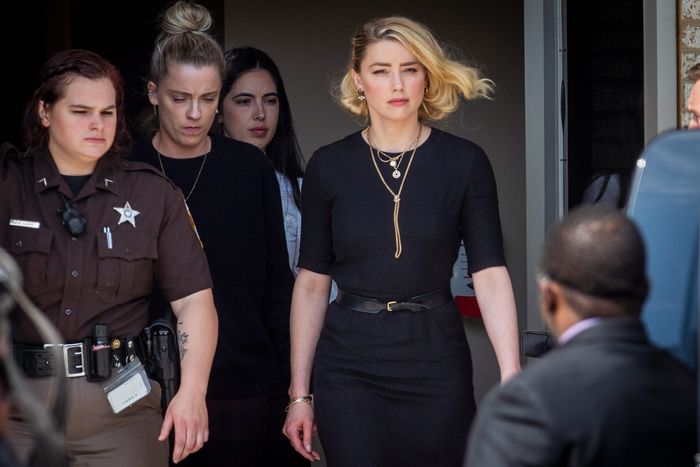
It was clear that Amber Heard would appeal the verdict the moment Johnny Depp won his defamation case against her. There was the matter of money: The Fairfax County, Virginia, jury that heard their case awarded the Pirates of the Caribbean actor more than $10 million, which Heard reportedly just doesn’t have. And then there was the matter of setting a precedent. Heard’s decision to fight the verdict is also rooted in the principle of their legal dispute. Depp sued Heard over a 2018 Washington Post op-ed she had written about domestic abuse that, notably, didn’t once mention his name.
Depp convinced a jury that their acrimonious split several years prior to this op-ed — during which a photo of Heard’s bruised face appeared on the cover of People — made it clear she was referring to him. Throughout the six-week trial, which aired on CourtTV, TikTok, and various livestreams, Depp insisted that he was not abusive, which he claimed meant that her op-ed pointing to him was false and defamatory.
Depp claimed that he lost millions in movie earnings because of her allegations. Heard, who countersued Depp, contended that he abused her physically and emotionally throughout their tumultuous relationship and claimed that his denials harmed her reputation and career. In the end, Heard did win $2 million at the trial over a statement that Depp’s lawyer, Adam Waldman, made to the press claiming that an alleged fight between her and Depp was a “hoax.” For Heard, an appeal reflects her insistence that her allegations of abuse are true. An appeal also provides an opportunity for Heard’s case to be argued more thoroughly on First Amendment grounds.
Indeed, the opportunity for Heard’s team to argue that she has a constitutional right to speak her mind about abuse was almost entirely lost in the made-for-tabloid mudslinging. Heard’s team announced on August 15, 2022, that she had retained attorneys David L. Axelrod and Jay Ward Brown, of Ballard Spahr, to helm her appeal. Axelrod and Brown were on the legal team that helped the New York Times best Sarah Palin in her 2017 defamation lawsuit against the paper. (One of Heard’s leading trial attorneys, Ben Rottenborn, remains on Heard’s legal team; Elaine Bredehoft, who also helmed Heard’s defense, is leaving.)
As Deadline accurately points out, “The makeup of the new defense team makes it apparent that Heard’s appeal will focus on the First Amendment aspect of her legal fracas with Depp.” Vulture spoke with several veteran attorneys about the next phase of Heard’s case — and whether she has any chance of a successful appeal.
Why is Heard bringing up the First Amendment now?
Let’s back up a minute. It’s not that the First Amendment never came up at trial. In fact, Rottenborn said during opening statements: “Of those words that Amber wrote, are those protected by the First Amendment? And the answer is very clearly yes.” However, as anyone who watched even a minute of the trial knows, these were not particularly cerebral proceedings where rights and freedoms were weighed with incisive discourse about the Constitution and our Founding Fathers. Rather, we heard infinitesimally more about “cocaine Johnny” and Depp’s severed finger. (So much about the severed finger!)
“When it comes to protecting the fundamental right of freedom of speech, we look at the jury’s decision — to paraphrase a famous quote — not ‘as the beginning of the end but merely the end of the beginning,’” Heard’s representatives said of the changing legal team. “A different court warrants different representation, particularly as so much new evidence is now coming to light.” Neama Rahmani, president of the Los Angeles West Coast Trial Lawyers, told Vulture that it’s not surprising Heard is hiring First Amendment attorneys now “given the stage of her case.”
Arguing before an appellate court, which is Heard’s next stop, takes “a very different skill set,” Rahmani said, compared to arguing before a jury. Juries are made up of people in the community, while an appeals court is composed of judges who see the bulk of the arguments in written briefs instead of orally. “You have to be a really good writer. That’s not as important of a skill for a trial lawyer who’s presenting a case to a jury,” Rahmani added. When appeals lawyers do get their chance to make their oral arguments, it’s “very different arguing to a judge or a group of judges” compared to a jury.
Does this mean Heard’s case will actually be about the First Amendment and not just Depp?
Roy Gutterman, director of the Newhouse School’s Tully Center for Free Speech at Syracuse University, said it’s possible. “The appeal is definitely an opportunity to reframe the case and bring it back to some of the First Amendment elements and some of the First Amendment issues that really did get washed [away] in this celebrity circus,” Gutterman said. “I watched probably more of that trial than I should have, and you know, it turned into a discussion about a dysfunctional marriage and allegations of domestic violence that really had nothing to do with the underlying defamation issue, really.” Heard’s new attorneys could help foster this shift in the narrative around the case. “They represented the Times in the Palin case, so they’re going to do a pretty good job of reframing the issue and bringing it back to these First Amendment elements that seem to have gotten drowned out in the chaos of that trial,” Gutterman said. Axelrod and Brown have said they are “confident” the appeals court will reverse the verdict and “reaffirm the fundamental principles of freedom of speech.”
Could Heard actually win her appeal?
Several attorneys told Vulture that they didn’t think Heard had a good chance of winning her appeal. Holly Davis, a partner at Kirker Davis, said that an apparent shift toward focusing on the First Amendment is happening only after Heard’s other efforts to fight the verdict failed. “It makes sense that she is using legal experts on First Amendment rights as her last resort. The problem with this, in my opinion, is the timing of it all,” Davis said in an email to Vulture. “Heard’s prosecution of the case over the six-week trial period focused exclusively on whether or not it was true that she was a victim of domestic violence at the hands of Depp.” The appeals court is limited when it comes to deciding on issues that weren’t brought up extensively at trial; they can only look at what happened at the lower court proceedings to see whether there was a legal error. This is a huge burden, but it explains why Heard hired a new team to comb through the extensive trial with fresh eyes. They might “be able to pull a needle out of a haystack to find this harmful error,” Davis said. The timing isn’t great for Heard, though. First Amendment appeals attorneys weren’t around at trial objecting to Judge Penney Azcarate’s decisions, meaning there might not be that much they can meaningfully bring up now. Still, it’s worth a shot. “Hiring them after the fact to do the cleanup work is a risky move, and it may be the last move she has before conceding legal defeat,” Davis said.
Like Davis, Los Angeles–based attorney Mitra Ahouraian didn’t think Heard’s prospects were good. “The general consensus within the legal community is that Amber Heard will not win an appeal. An appellate court is unlikely to overturn the ruling of the lower court, which only happens when there is a mistake of law or procedure that resulted in prejudice to the appealing party and would have affected the outcome of the case,” Ahouraian said in an email to Vulture.
If Heard loses her appeal, does that harm First Amendment rights more broadly?
It’s complicated. The results of this trial and, now, appeal concern both the practical and legal realms. Accusers and victims can see what happened to Heard and worry that they will suffer the same legal penalties — not to mention social-media backlash — that she did.
“At issue in this legal battle is the ability of victims of intimate-partner abuse to speak freely about that abuse,” Hannah Meropol, an attorney at victims’-rights law firm C.A. Goldberg, PLLC, told Vulture in an email. “I hope that people will take this appeal as an opportunity for more meaningful and nuanced discussions around free speech and victim’s rights.”
Meropol continued by saying that “the social-media spectacle surrounding the Heard-Depp case and the actual outcome of the trial interacted to create a deterrent for victims who are contemplating seeking accountability for their abusers,” noting the risk of retraumatization of going back to court. Throughout the trial, Heard and Depp’s names trended consistently on social media; notably, Depp fans made TikTok and YouTube accounts just to garner clicks and join the pile-on against Heard. It got so bad that Heard’s attorneys had to comment on the debasing nicknames people were calling her online, and the vitriol on both sides even became the subject of a 30-minute documentary, Marriage on Trial, from NBC News. “Sadly,” she said, “it is doubtful that the appeal, regardless of its outcome, will significantly counter that chilling effect.”
The firm has “increasingly seen abusers use retaliatory lawsuits against victims who disclose their abuse as punishment and to gain PR advantage,” according to Meropol. When victims can, they have a strategy before publicly disclosing abuse, the attorney said, adding, “It’s important for victims to know the risks of speaking out, but it’s also important for them to know that, though an abuser may retaliate, it doesn’t mean they’ve ‘won,’ and there are legal avenues available for the victim to fight back.”
Because the Heard trial team failed to extensively go into the First Amendment issues, Davis said, “we will never know whether it could have impacted First Amendment rights for victims and accusers.” Although they could have explored free speech, Depp’s attorneys successfully framed proceedings as a defamation case — about the veracity of allegations — and a jury determined that Heard knew they were incorrect when she made them. “The success by Depp on the defamation legal standard swallowed up a successful First Amendment claim by Heard, in my opinion,” Davis said. She didn’t see this as a death knell for free speech, however. “This is good news for free-speech advocates, in my opinion, because this case is distinguishable from other squarely First Amendment cases.”
While Heard is using her resources to prepare for a case that experts find to be an uphill battle, Depp recently settled an assault lawsuit and is accused of stealing lyrics from a deceased folk poet. Oh, and he’s directing his first movie.


